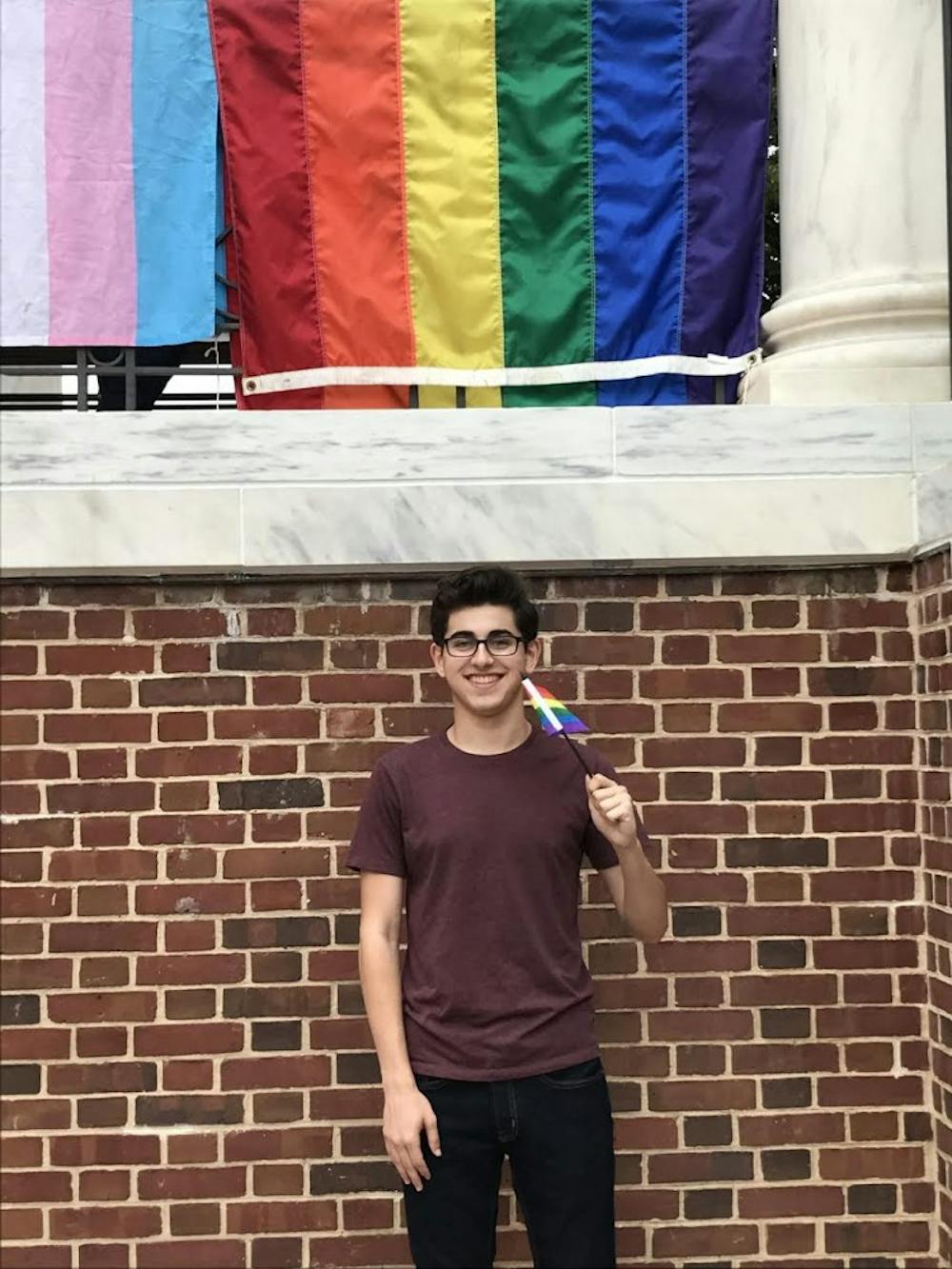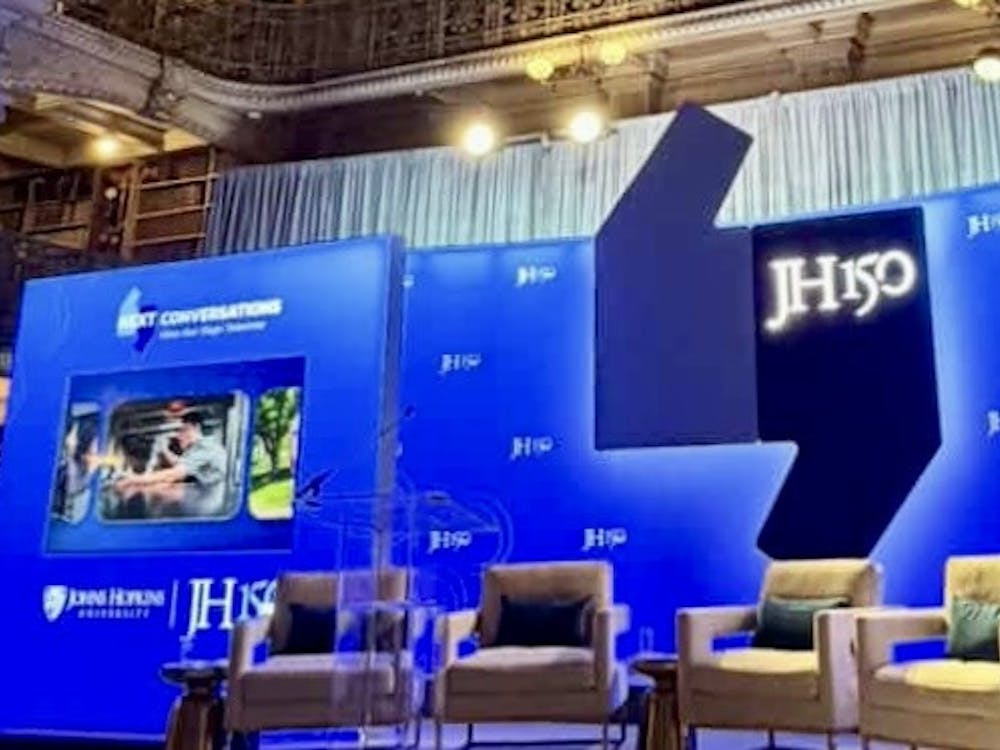
Amelia Isaacs, a dear friend of mine, recently wrote an article in order to break out of a box she’d put herself in by introducing herself as “the British girl” in her first Voices column. She also broke out of the boxes others had put her in by insensitively assuming her ethnic and cultural background. I recommend you read Milly’s thought-provoking piece for yourself, but, to summarize, she explored the nuances of her identity and debated the usefulness of labels.
“I strongly believe that labels are great for some people, and it can be validating and empowering to be able to assign a label to the identity that they have. But not everybody wants to put a label on themselves, and it is nobody else’s right but your own to decide what that label is or isn’t. Whether that’s in terms of your gender, race, sexuality, religion — whatever it might be — it’s your choice,” she wrote.
Last Thursday I literally tagged myself with a label; for National Coming Out Day, I wore extra-long half-rainbow, half-purple socks that had the word “GAY” sewed on them in white letters. I didn’t really want any attention, but, having no particular desire to wake up early for breakfast at the Office of LGBTQ Life, I felt obligated to celebrate queer awareness in another way. Wearing socks that I had borrowed (and never returned) from a friend for New York City Pride in June and that could now scream on my behalf seemed like the move.
I wanted to encourage fellow Blue Gays to embrace their gender identity and sexual orientation with open wings, and I also wanted to commemorate the anniversary of my own official coming out. Last year on the evening of National Coming Out Day, as a freshman, I posted a picture to Instagram of me standing underneath a giant rainbow flag at the Breezeway captioned “Going back in the closet if this doesn’t get a lot of likes #foreverablueGAY #gohop.”
Posting this photo was exhilarating. I was so inundated with likes and comments that I could barely focus on studying for the midterm I had the next morning. Why prioritize learning how to categorize statues from ancient Egypt, I told myself, when I have the more important task of excavating my own label from the dunes of repression?
Indeed, my sexuality was no longer a hieroglyphic secret confined to my closest friends and immediate family nor an underground maze that my peers had sort of solved; it was a pyramid visible to nearly all my friends and acquaintances.
As I explained to a Hopkins friend who had questioned my decision to post, I was seeking to, one, free myself from the ghost of a two-and-a-half-year-long relationship with a girl in high school (our relationship, my blatant lack of self-awareness aside, was more toxic than a Tide Pod) and, two, finally be able to showcase a part of myself that I had long kept hidden to others and myself.
I never wanted a straight male to solicit my opinion on a girl’s appearance or a straight female to mistake my friendliness for flirtation ever again. I am by no means the paragon of masculinity, but heterosexuality is the default, and I’m not nearly as flamboyant as that pair of socks I recently donned.
I hoped that, by being openly gay, I would avoid awkward situations. Yet accepting and, metaphorically, wearing the gay label has actually ended up causing some discomfort.
To be clear, I speak from a place of privilege; I am immensely grateful that being out of the closet does not threaten my safety and that I have never fallen victim to homophobic discrimination or violence. But I sometimes feel as though I am defined by my sexuality.
Despite my attention-seeking post freshman year, I hadn’t wanted to make a big deal out of my sexuality like I had done in high school, when I had come out to my closest friends so that I no longer had to keep my agony over an unrequited and somewhat obsessive crush to myself. I was being honest about feelings I’d tried to bottle up, which made my friendships deeper, but doing so also made them more superficial; if I were female, a number of my conversations senior year would have failed the Bechdel test. I was so boy crazy that some of my friends, not unsurprisingly, subtly began to expect me to conform to gay stereotypes.
Determined not to repeat history, I didn’t come out to anyone at Hopkins during my first month or so here because I didn’t want anyone to know I was gay until after they got to know all the other components of my identity. I wanted to become my friends’ best gay friend, not be forced into the dehumanizing role of their gay best friend. Notwithstanding the media’s one-dimensional representations of queer individuals, I am so much more than rainbow-colored arm candy.
I don’t mind — I enjoy — providing my friends with emotional support, but I am neither a 24/7 therapist nor a supporting character in someone else’s story.
Like anyone else, I transcend clichés associated with the labels I use to explain myself. I may sing along to One Direction and Ariana Grande in the shower, but I’m not fond of shopping nor showtunes, except for the Fiddler on the Roof soundtrack. I’m not a “bad gay” because I haven’t gotten around to seeing Lady Gaga in A Star Is Born, our friendship should be deeper than a shared infatuation with Shawn Mendes and, no, my floral shirt is not in homage to Tan France from Queer Eye.
Last Thursday a friend from high school posted a collage of photos with her girlfriend captioned “If you didn’t know already #nationalcomingoutday #hehe.” In July the three of us got açaí bowls together; they held hands under the table the whole time before finally revealing that they were dating.
Afterward I texted my friend, who I had previously thought was straight, asking what label, if any, she was using to describe her sexuality. (I recorded her response in my Notes app, knowing I would one day put it in a Voices article.)
“I would say I most closely identify with pansexual,” she wrote. “However I am not committed to that label or care to label myself fully.”
“Labels should be for comfort, but there’s no need for one if nothing fits right at the moment or ever or if you don’t want one,” I wrote.
Labels can help us to articulate and normalize our beliefs and identities, but they can also limit how we understand ourselves and others, because, like Milly argued, “humans are not made to fit into boxes that can be ticked and crossed.”
National Coming Out Day reaffirms that queer individuals are entitled to authentic self-expression, but coming out of the closet should not entail getting stuck in another box.





